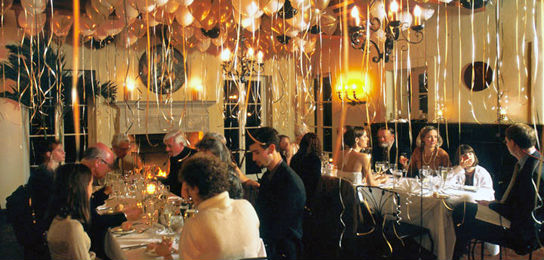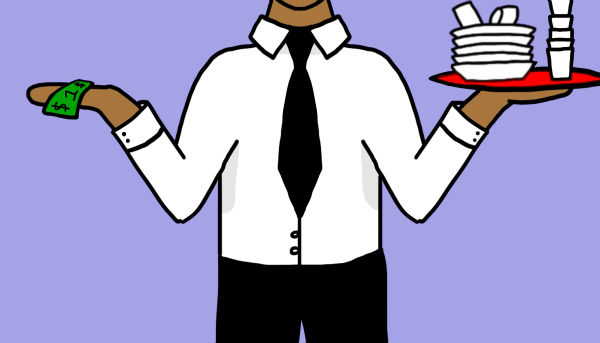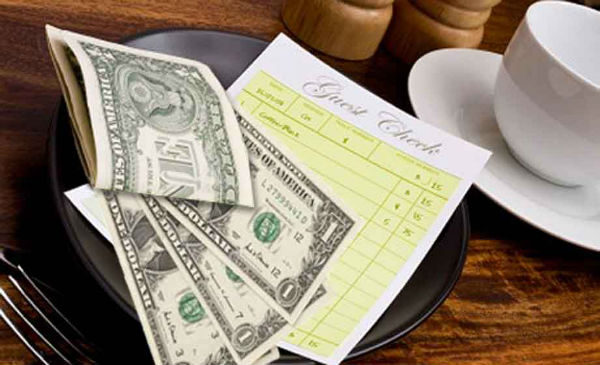New Year’s Eve is one of the most painful nights of the year to work in restaurants. Behind the scenes, everyone’s normal routine is turned upside down. In addition to our normal chores like folding napkins and polishing silverware, we have to blow up balloons, lay out party favors and hang streamers. To make things worse, NYE is always one of the latest nights of the year for cooks and waitstaff; customers have paid a lot of money and just don’t want to leave. And when they finally do, guess who gets to clean up the frat-house-like mess the partygoers leave behind? At more clubby establishments, it’s almost guaranteed that someone will throw up in the sink. Sure you can make a lot of money, but you’re also expected to manufacture fun for people who were too lazy to plan it themselves and whose expectations are often unrealistic.
Restaurants have made a cottage industry hosting people’s NYE celebrations, and they’ve learned a lot of tricks on how to take your money. The people serving you will try not to make it too obvious that they how little they really care while they’re picking your pockets.
Most restaurants offer two seatings. The early seating is discounted slightly since you’ll be expected to vacate your table before the countdown. Even though you were warned in advance, this can often result in your feeling rushed. Guests pay a premium for the second seating which may include a ”complimentary” champagne toast at midnight. Some will feature a band, DJ or dancing. Prix fixes are usually well over $100 a head and guests will be expected to guarantee the reservation with a credit card.
Restaurants feel increasing pressure to squeeze every drop of revenue out of New Year’s Eve because January and February can be painfully quiet months. Ever notice how many places permanently close in the first week of January? They always wait to squeeze out every last drop of the holiday revenue before they call it quits for good.
So, why does spending New Year’s Eve in a restaurant suck so badly? Here are five good reasons you should just STAY HOME:
Undue Stress – Going out to a restaurant on New Year’s Eve is a whole production for some people—dressing up, worrying about your outfit, getting stuck in horrible traffic, running late, meeting up with that other couple that you really don’t like who always cheats you when you split the bill. The pressure of making the experience memorable weighs everything down. For all the money you spent, it never really lives up to the hype. Speaking of which…
Surge Pricing – Restaurant real estate is already valuable in popular establishments and New Year’s Eve is a golden opportunity to gouge you. Most places don’t charge what they should, they charge what they can. They’ll advertise a “champagne toast” then pour you some crappy Prosecco. Menus are usually filled with all kinds of upsells and supplements. Add foie gras, a raw seafood tower or white truffles? C’mon, it’s New Year’s Eve! The sommelier will provide a wine pairing from the reserve selection for an additional $100 per person. The goal is to extract as much money as possible from people who are in a festive mood. A few more glasses of that cheap Prosecco and you won’t know the difference.

Apathetic Staff – The people serving you may look like they care but they’d much rather be celebrating with loved ones. The truth is: most of the staff is also probably drunk by 9pm. New Year’s Eve can be a lucrative money night for tipped employees but the staff is usually depressed that they don’t get to participate in the party. Occasionally, you’ll look over and see the bartender making out with his/her girlfriend/boyfriend at the other side of the bar while you’ve been waiting twenty minutes for your drink. Happy New Year, sucker!
Mediocre Food – New Year’s Eve Menus are usually very basic, stripped-down versions of the actual day-to-day menu. They’ll usually include a few token luxury items like caviar, lobster or Filet Mignon to bait interest and make you feel like you’re getting something special. Otherwise, it’s usually a pretty basic package of cookie-cutter dishes designed for speed, efficiency and scale. Restaurant kitchens function like factories when the menu is fixed, cranking out product with less attention to detail.
Too Many Drunks – Restaurant visits can always be compromised by loud, obnoxious people encroaching into your space. On New Year’s Eve, it’s almost inevitable. If you get drunk enough, you’ll fit right in. But if you’re looking for a more quiet intimate experience with someone special, the environment can become toxic at any moment. It’s a risk you always take when you choose to celebrate something in public. Only this time, it’s costing you a lot more.



